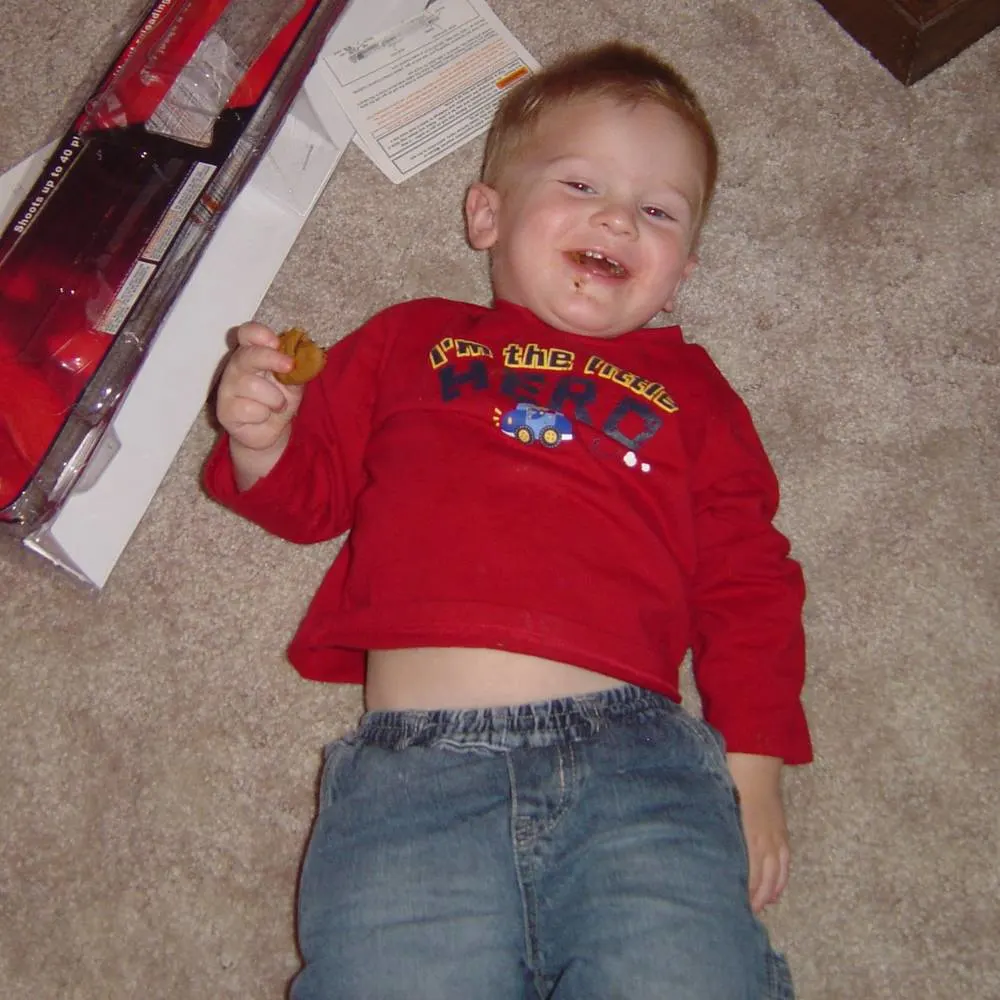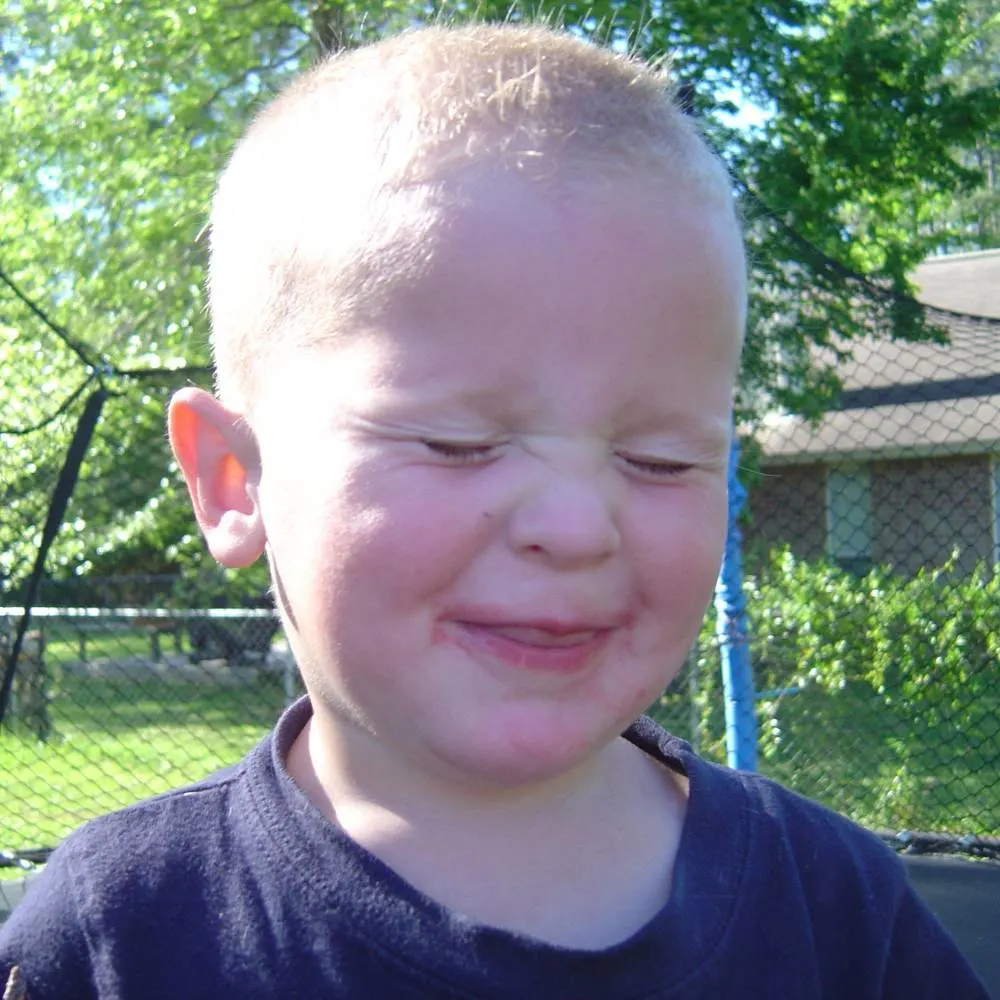- Clay Moon Phase Wall Hanging - July 4, 2023
- What To Do When a Toddler Won’t Keep Their Blanket On - June 10, 2023
- How Do Child Locks Work in Cars? (And When To Use Them!) - June 10, 2023
Disciplining a toddler is tricky, especially if yours is the type who laughs or giggles when in trouble. Although this reaction is normal and expected at this age, it might feel like a challenge or mockery. Therefore, you must find ways to deal with such behavior to discipline your child correctly.
Effective ways of dealing with a toddler that laughs when in trouble include remaining calm, positive reinforcement, and being consistent and firm. You must first understand why your toddler behaves the way they do in order to deal with their behavior correctly.
This article provides tips to help you deal with a toddler who laughs when in trouble. But before we get into tips and suggestions, I’ll discuss the reasons behind this behavior.

Why Toddlers Laugh When in Trouble
Toddlers behave differently when they’re in trouble or when you try to discipline them. Laughing or giggling can be frustrating, causing you to lose your cool.
But why do they do this?
They Might Be Overwhelmed by Emotion
Some children are highly sensitive by nature. Therefore, they take correction as a personal attack, triggering feelings of shame. As a result, they might laugh, run away, or cover their ears as a coping mechanism. Sometimes, they might even lash out.
While this behavior is socially unacceptable, children only do it to deal with their emotions. Most toddlers don’t know what to do or how to control their feelings, hence the odd behavior (source).
They Use It as a Distraction
Toddlers’ brains aren’t well developed, so they can’t cope with your anger and disappointment. Cognitively, your toddler knows they’ve done something wrong, but emotionally they don’t know how to act on their impulses. Therefore, they may laugh as a distraction from the stress and discomfort.
Additionally, it might also distract you from the main issue as they try unconsciously to establish normalcy.
Trying To Maintain Control
Toddlers will also laugh when they’re in trouble to try and maintain their pride and dignity (source). If your child is 2-3 years old, they can understand that they did something wrong. For this reason, they might feel worried or hurt, but try to hide it by laughing to save face.
Toddlers may act like they don’t care to conceal their hurt. My son did his very best to hide it but I could always see tears welling up in those sweet eyes after a few minutes.
In some instances, a toddler might laugh when they’re upset or nervous. When they sense your anger, they may get scared, and laughing may be their first instinct.
They Might Think You’re Being Funny
It may be hard for some toddlers to recognize when they’re in trouble. So, they might think your reaction toward their behavior is funny, resulting in laughing.
Thus, their laughter is especially highlighted in instances when you get out of control. Since the toddler may not realize their mistake and haven’t seen this side of you, they take it as a joke; this explains why a child might laugh louder the more you act out of character.
Tips To Deal With a Toddler Who Laughs When in Trouble
Once you understand why your child laughs when you try to discipline them, it becomes easier to deal with these behaviors. In addition, this understanding helps you learn your child’s patterns and personality and identify more effective disciplinary measures.
Here are some tips to help you deal with a toddler that laughs when in trouble:
Remain Calm Even When You’re Angry
Remaining calm as your toddler laughs when they are in trouble is easier said than done. If your child mistreats someone else and starts laughing–and more so when you admonish their behavior–it can be difficult to remain calm.
You might think you’re raising a little monster, which could trigger your anger and make you want to punish them more.
The truth is, turning physical or yelling will make matters worse. Toddlers respond best to calm, stable behavior, and structure. The best avenue is to separate your toddler from others in a time-out so you both can emotionally calm down before going any further with emotions on high.
Remaining calm ensures that you both get time to cool down, and you can discuss things when each of you are at your best.
Communicate Effectively
Resorting to yelling and spanking might bring instant results, but this strategy doesn’t work in raising emotionally healthy children.
Hitting can traumatize them, affecting their brain development.
Talking and reasoning with your toddler are underrated approaches because they’re tedious and won’t yield instant results. But it’s one of the best ways to ensure your toddler grows into a confident and emotionally stable adult.
Hence, normalize talking to your kids as early as they’re born. Even though they won’t understand you at the early stages, it helps create a routine. Additionally, they can read and learn your voice intonation and facial expressions, allowing them to differentiate between when you’re serious and when you want to play.
Toddlers between 2 and 3 years old can partially understand you, and talking to them benefits you both in the long run.
Calmly explain to your child that what they did is wrong, and tell them what you expect of them.
Additionally, let the child know you understand how they feel and give alternatives to laughing. For instance, you can tell them that when people misbehave, the best thing is to apologize instead of laugh.
Let your child know what smiling or laughter means and the appropriate time to do it. Let them know that laughing when people are serious can be understood as being rude.

Be Firm and Consistent
The only way to create lasting habits for your little one is to be consistent and firm.
Ensure your toddler understands you’re in charge by standing your ground and being firm in your action. Sometimes it might feel impossible, but going back on your word or punishment will show them that you aren’t in control. As long as your action is within reason, don’t let the child control you.
Ensure you’re firm as you talk to them when they do something wrong; this approach ensures that your child takes you seriously.
Consistency is vital in shaping your toddler’s behavior. So, be consistent with your words and actions. Although it may not make sense to them initially, they’ll get the message in time. Consistency will also help you deal with other issues, such as tantrums and outbursts (source).
Employ Positive Reinforcement
Rewarding your toddler for positive actions is as important as calling them out for bad behavior. Therefore, ensure you commend your child whenever they behave accordingly. This is especially critical when they act well after talking to them.
It helps to commend or reward your child if you ask them to apologize instead of laughing, and they behave accordingly in the following episodes. You can offer a physical reward such as a toy or a favorite snack. Additionally, you can also praise and clap for them when they behave correctly.
Use affirmation as positive reinforcement. Highly sensitive toddlers may associate your correction with a lack of love. They might think that you no longer love them because they acted up. Hence, you must assure them of your love even as you correct them.
Holding them on your lap or kneeling to their level is a great way to show that you still love them even if you aren’t happy with them. It’s essential to remain calm when you explain things to your toddler so that they understand that the correction is coming from the point of love.
Be Attuned to Your Child
Learning about your child is the best way to deal with their odd behavior. Attunement means putting yourself in your children’s place and viewing the world from their perspective.
Attunement helps you imagine and to know what is happening in your toddler’s mind. For this reason, you can anticipate your child’s reaction and mitigate it before it happens.
Attunement goes together with early intervention. Once you learn the toddler’s patterns of misbehavior, you can intervene before they get in trouble. Hence, you avoid the feelings that cause your child to laugh when you try to correct them.
Toddlers have numerous needs, and they lack the skills to communicate effectively. Therefore, it helps to anticipate their needs and take care of them before the child gets in trouble.
For instance, if your toddler wants another child’s toy, you can calmly tell them to ask to borrow it before they take it by force.
Additionally, you can guide them to an alternative toy before they start fighting over another child’s toy. Early intervention prevents reaching the point where you need to discipline the child (source).
Redirect Your Toddlers Attention
Toddlers are repeat offenders, especially between one and two years old. The best way to prevent numerous disciplinary episodes is to redirect them. But you must be creative and well-attuned to your child’s needs.
Redirecting means you need options and alternatives. For instance, when the child starts warming up for a tantrum, you can turn on the tv to steal their attention. Additionally, you could take them out in the garden for a while to help them to calm down.
Once they are calm, you can ask them what they want and provide it if you can. If you can’t, you need to explain to them why or offer an alternative.
See my guide on What To Do When a Toddler Doesn’t Respond to “No”.
Set Rules
Rules work better for older preschoolers because they can understand the concept of consequences. Ensure rules are short, simple, and straightforward.
You can start with simple rules such as:
- Picking up after oneself.
- Apologize when you hurt others.
- Don’t take other people’s stuff without asking.
- Report an injustice instead of fighting.
The best way to set rules is to align them with your child’s repeat offenses to help them stay out of trouble.
Spanking and Yelling Doesn’t Help
A toddler that is laughing inappropriately after making a mess or spilling things around the house can tempt your patience. When you aren’t emotionally stable, this may cause you to feel angry and overwhelmed.
However, remember that yelling or spanking will only scare your child, which might worsen their problem. Sometimes, you might get instant results, but you risk raising an angry and mentally unstable child.
Toddlers are curious since they want to discover the world around them, and they will get in trouble more times than you anticipate. For this reason, you must exercise self-control to set an example of good behavior for your children.
Your child will pick up on any of your bad behavior, and they will repeat it. As stated before, hitting or yelling at your child affects brain development, causing it to shrink and limiting its functionality (source).
Consult an Expert
Consult an expert if you think your child is out of control.
Your pediatrician can help determine what is normal and what’s not and, if necessary, where to find help and support in dealing with abnormal behavior.
Final Thoughts
Parenting is a harrowing journey without a map; it doesn’t help to be too hard on yourself or your child. Keep calm and enjoy the ride!
Author Notes:
Teresa is a Registered Nurse in the State of Texas and the mother of two. Opinions and insights on childcare are based on professional knowledge, academic research, and personal experience.
Recommended Reading:
- What To Do When a Toddler Pushes You Away When Crying
- Why Do Toddlers Throw Everything on the Ground?
Make Your Own Beautiful Living Succulent Wreath Centerpiece! Complete video course by Jeannine Romero now available through Skillshare.
